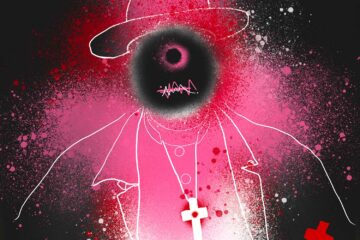Overview: In this short solo episode (ep 129), Adam Williams explores the mind-bogglingness of the Universe and our human arrogance to think it gives a fuck about what we give a foolish fuck about. He wades into our relatively insignificant places as humans in the vast universe and considers what our true significance actually can be.
Do you know the distance of a light-year? How many light-years across the universe reaches? How many galaxies are in it? Adam dug up those fun facts for this episode … Not that he can fathom what any of them really mean. Mind. Blowing. (Released on podcast on Jan. 28, 2023)
Also on Apple, Spotify, Pandora, Stitcher, YouTube, Google and other players.
EP 129 SHOW NOTES, LINKS & TRANSCRIPT
Connect with Adam Williams
Humanitou on Instagram: @humanitou
About Adam
Art & Poem Credits
Podcast cover art: Adam Williams
Music
“Old Rope” by Joe Johnson | joejohnsonsings.com
Original Written Version
I’ve been watching a sci-fi show on Hulu, “The Orville,” and it’s got me wondering what Google knows about the prospects of parallel universes, the multiverse and the like. Could they be real?
And that got me thinking about the size of the universe we are part of, which I also had to look up, because I had absolutely know conceivable guess to make. The answer: 93 billion light-years in diameter. Now, I still have no conceivable guess to make about what that even means. Can’t fathom it.
Google, how far is a light-year? The answer: 5.88 trillion miles (9.46 trillion kilometers). That’s based on light traveling at a rate of 186,000 miles per second. Somehow. Nope, still don’t get it. Every bit of this is inconceivable to my imagination.
Distance, light and year, which equates to ~365 days of time, in my mind, don’t make sense together.
My context for speed and travel consist of ideas like: The furthest I’ve ever walked in a day is somewhere around 15 or 16 miles. The furthest I’ve ever run in a day is twice that (50k). The furthest I’ve ever driven in a day is probably 1,100 miles. Even throwing in travel by train and plane, I can’t get into any proximity of imagination on this light-year thing.
The Milky Way galaxy is believed to include 100 to 400 billion stars within it, and stretch ~100,000 light-years in diameter. The universe is thought to be filled with at least several hundred billion galaxies, and as many as two trillion in the observable universe.
Our solar system of planets rotating around the star we call the sun, is a tiny piece of the Milky Way galaxy.
A line of curious questions I’ve carried and long been amazed, and a little mentally bent, by is, how can space be infinite? And if it’s not infinite, then how can it be contained (and by what?) and what is beyond that boundary? It breaks the brain, my brain anyway, trying to envision the possibilities.
To revisit the idea of the vastness of space recently was a reminder of how little space we as earthlings and humans, let alone as individual beings, occupy in the big scheme. How little our ripples in the universe must be?

Image via NASA (description in addendum)
Yet our ambitions and anxieties, squabbles and … our everything consumes us, drives us, derails us, defines us … to us. Not to the universe.
The universe doesn’t need us. We need us. And we need the universe, even if we can’t imagine it. Then again, if we can’t imagine being connected to our neighbors, how can we begin to understand our connection to the universe? But I digress, sort of.
In “Moby Doc,” a documentary about and by Moby, the legendary musician and bogglingly diverse and innovative artist, he says:
“What’s more interesting is, at least to me, is the why of it. The why of everything. Why do we do what we do? Our very short lives quite possibly have very little significance.
“As far as we can tell, we’re in a universe that is vast beyond our imagining, ancient beyond our imagining. But yet all of us generally work from a place where we think that our actions have meaning, our lives have consequences.
“And that if we do things in a certain way, if we do things in a right way, that our lives might somehow be better. ‘If I had legitimacy, if I had some money, if I was recognized for what I did and who I was, and if I was esteemed, happiness and meaning would ensue.’
“I think that a lot of us still work under those assumptions, that if we do the right thing, if we have the right existential portfolio, if we have the right people, the right amount of money, the right home or homes, the right job, the right amount of recognition, then everything will suddenly make sense and we’ll be happy and we’ll live for a long time, and we’ll die contented.
“There’s one huge problem with that, though. That’s never actually been the case for anyone. It’s almost like we assume that it’s not true for everyone else, but that if we figure it out, like, if I figure out my perfect existential portfolio, I will find perfect human happiness. But I tried, and it didn’t work.”
Most of my days, and I dare speculate yours, too, are spent in self-absorption about what’s going on in the hyper-immediate vicinity. My work, my family’s schedule, the to-dos on my plate, the hassles and hopes, where my creative work will lead me or not.
I don’t consider myself to be a selfish person, and yet in a larger context, I am focused on my own existence, so how can I/we not fairly conclude it’s selfishness …
… in a universe that is ancient beyond my and Moby’s imaginings, physically vast beyond Moby’s and my imaginings. Ninety-three billion light-years of existence in all the unimaginable forms. And my brain is focused on me and mine, all who can fit within the square footage of a family four-door passenger vehicle, never mind the vastness of all that exists, perhaps infinitely, outside those car doors.

“Kepler-444” — Image via NASA (description in addendum)
So my mind focuses on me and mine, and your brain is focused on you and yours. And sure, sometimes maybe we are focused on a shared us and ours. Yet even that is so infinitesimally small in the scope of it all.
With that frame of self-oriented mind, I’ve had experiences few and far between that have made me pause, breathless and grasping at recognition of how amazing the universe is and how I’d do well to let go of my tiny self in the flow of it all.
Living in the mountains and frequently spending time out on trails and in the wild, I often pause and look around to take in and wonder how these lands came to be, and I’m grateful to be among them. On a larger and rarer scale …
One such heart-jolting, perspective-shifting experience as a tiny being within the unimaginable universe came during multiple nights of witnessing the aurora borealis. If you’ve never caught the live show, it’s so much more awe-inspiring than photos and videos capture.
That’s because those are long-exposure images that make the sky appear somewhat static and, in a sense, smoother and richer in their colors. Those images give the impression that the sky just sits in vibrant splendor all night long and for months on end. Not so.
And while the experience of them is different to the naked eye in real time, that means getting to experience ephemeral moments never to be truly duplicated. It’s a breathless experience of awareness and presence. And beautiful smallness.
Watching the Northern Lights, the colors come and go, created by the movement of solar winds. They appear in varied displays, similar but like snowflakes, individual in their patterns and movements. The colors aren’t necessarily as deep and rich as shown in photographs, but they’re no less inspiring to behold.
When I got to watch the aurora borealis while in northern Iceland in September 2019, I saw lights ripping open the dark fabric of the night sky, cascading down and washing like a theater curtain laterally across the sky-stage.
It was a dance at times, something magical. It could occur in multiple sections of the sky simultaneously, with separate events sometimes running headlong into one another, and sometimes forcing me to keep my head on a swivel in attempts to follow the action in multiple spaces at once.
At times, the performing lights would dissipate as suddenly as they would arise. And then I’d wait in the cold, dark hours of the night, afraid to go back to bed, knowing I’d miss limited opportunities to witness this ancient phenomenon, if I did.
Such rare experiences, such beautiful reminders of the vast more that lies beyond our grasp, and such scientifically studied facts as the universe reaching 93 billion light-years across, could feel daunting and diminishing of our worth. But I don’t feel it that way.
Instead, I feel liberated by this awareness. We give too much weight to ourselves, to our beliefs, to our identities, job titles, money, cultural and political ideals, to our social bonds and perceived differences. All of that is what’s not significant.
Moby said, “Our very short lives quite possibly have very little significance.” I don’t think that means our lives don’t matter.

By Johny Goerend (Unsplash)
I think that means the things we collectively obsess over, like identity politics, wealth, fame, career success, illusions of scarcity, and all the things that cause us to feel anxiety, depression, anger, fear, conflict, disconnection, lack of empathy, etc., aren’t worth our energy. They are what has very little significance.
I’m not interested in making life worse for myself or others. I’m not interested in that narrow, microscopic view that so egoically presumes we are the universe around which 93 billion light-years of existence beyond our comprehension revolves. It’s an arrogant, petty illusion. It’s a waste of the lives we have and share.
Rather, it’s freeing to know that if our lives are almost immeasurably small in the universe, then we can choose to make life what we want it to be, rather than fit into the human-made constructs that currently are the ways we define our days.
Days. And years and decades until we die. This is how we measure our existence in a universe that is ancient beyond our imagining. Where is our humility?
We can choose to make existence enjoyable, equitable, creative, cooperative, supportive, nourishing, healthy and vibrant for not only ourselves but for everyone. That is a choice we can make daily.
We’ve built systems, official and un-, that support all the negatives and support the illusions in our lives, and they can be torn down. By choice.
The universe, or multiverse, does not care about our systems and illusions, and illusion of systems. It knows the truth. It is the system, the natural be all and end all that will prevail and carry on.
The universe is so vast as to render us insignificant, powerless, except over how we use what little time we get to have this experience of being.
We could feel awe at what surrounds us everyday, aurora borealis or not. We choose to turn away in our all-consuming self-absorption, as individuals, as humans, as Americans, as all the identities we myopically claim.
In recognition and acceptance of the truth of my insignificance, I feel liberated. I feel equipped to practice the letting go of my tiny human illusions of self-importance.
That truth is not cause for me, or anyone, to stop the creative work we contribute. It’s cause to believe all the more in it, to permit ourselves to immerse in it, to believe in its value as contributing to a reduction of suffering by ourselves and others, suffering that is unnecessarily fabricated by ourselves and others.
My past work in marketing, for example, might not have contributed to the wellbeing of myself, my family or humanity in any real, meaningful, spiritual, universally relevant way.
My creative writing and poetry, however, and my publicly shared conversations of humanness and connection with others via podcast, my artwork and so on, earn me less cache (and cash) in the systems we’ve created, but they stand a far greater chance of rippling meaning as the “insignificant” speck of dust that I represent in this universe.
Another go at it: If my work has no meaning to the course of the universe, then it might as well, at least, have resonant meaning to the daily wellbeing of me and those touched by me, to make our lives more harmonious. You know what I mean?
I’d rather contribute and perpetuate more joy and less suffering, than more ego, more anger, more fear, hate and self-obsession. More flow with the ease of the universe, less human-created drama.
That, to me, is endlessly rich in significance.
Addendum
1. The scattered stars of the globular cluster NGC 6355 are strewn across this image from the NASA/ESA Hubble Space Telescope. NGC 6355 is a galactic globular cluster that resides in our Milky Way galaxy’s inner regions. It is less than 50,000 light-years from Earth in the constellation Ophiuchus. (via NASA and European Space Agency)


